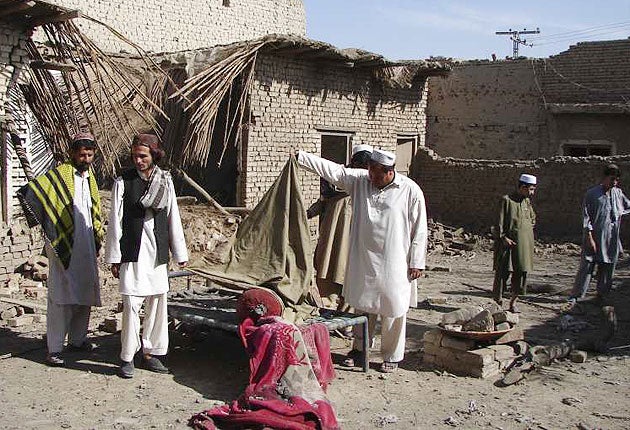US missiles hit Pakistan school

Your support helps us to tell the story
From reproductive rights to climate change to Big Tech, The Independent is on the ground when the story is developing. Whether it's investigating the financials of Elon Musk's pro-Trump PAC or producing our latest documentary, 'The A Word', which shines a light on the American women fighting for reproductive rights, we know how important it is to parse out the facts from the messaging.
At such a critical moment in US history, we need reporters on the ground. Your donation allows us to keep sending journalists to speak to both sides of the story.
The Independent is trusted by Americans across the entire political spectrum. And unlike many other quality news outlets, we choose not to lock Americans out of our reporting and analysis with paywalls. We believe quality journalism should be available to everyone, paid for by those who can afford it.
Your support makes all the difference.A volley of US missiles rained down on a Pakistani school linked to a Taliban leader in an attack that killed at least nine people just hours after the country's parliament warned against incursions into its territory.
In what was seen as a sign of America's enduring frustration with Islamabad's faltering campaign against militancy, a suspected CIA-operated pilot-less drone struck a madrasa in North Waziristan operated by Taliban commander Jalaluddin Haqqani, a former CIA and ISI asset now accused of launching deadly cross-border raids against Nato troops in Afghanistan. Reports suggested no students were in the madrasa at the time of the attack though that could not be verified.
The attack early today marked the second occasion that the Haqqani network has been struck in the past two months. Last time, at least 23 people were killed. Relations between Washington and Islamabad soured this summer when the CIA alleged that Pakistan's shadowy intelligence agency the Inter-Services Intelligence (ISI) had helped Mr Haqqani launch an attack on the Indian embassy in Kabul that left more than 50 dead.
Pakistan's military are increasingly involved in an assault against the militants who have built strongholds in the semi-autonomous tribal regions and in parts of the North West Frontier Province (NWFP). But the US, impatient at the progress being made by the Pakistan forces has been routinely using unmanned drones to search out and attack militants - especially those such as Mr Haqqani who are blamed for crossing into Afghanistan and carrying out attacks on Western forces. The US has carried out at least a dozen such air strikes since August.
While the Pakistan army stoutly denies the ISI's involvement in the attacks believed to have been carried out Mr Haqqani's network, it admits that it still maintains indirect links with the former mujahideen commander.
Earlier, Pakistani lawmakers united behind a common policy to tackle extremism. After weeks of fraught debate, marked by sharp divisions between the government and the opposition, Pakistan's political forces finally agreed to an unprecedented unanimous resolution. "Extremism, militancy and terrorism in all forms and manifestations pose a grave danger to the stability and integrity of the nation," the resolution said.
Despite the military offensive undertaken by the army and Frontier Corps (FC) paramilitaries, the resolution said that dialogue with the militants must be of the highest priority. However it added that negotiations should only be pursued with those elements willing to follow the constitution and the "rule of law".
By itself the resolution agreed late on Wednesday will likely make little practical difference. But the unanimous agreement will certainly provide the seven-month-old civilian government, headed by the late Benazir Bhutto's Pakistan People's Party (PPP), a welcomed measure of political support.
At the same time, Pakistan is also confronting a major economic crisis. Soaring inflation, rocketing food and fuel prices and a dwindling reserve of foreign currency has left the country in desperate need of international help.
The IMF announced on Wednesday by the IMF that Pakistan had asked for its assistance, with officials saying Pakistan needed billions of dollars in loans. Yesterday, Shaukat Tareen, the Pakistani official overseeing the talks, said his country urgently needed up to US$5bn. However, he said the government and Pakistan's president, Asif Ali Zardari, still hoped to get the money from the World Bank, rather than taking money from the IMF.
"We have not formally requested the board of the IMF for a facility, as of now," said Mr Tarin. "In the next 15 to 30 days, we need cash. We'll make a formal request to the board of the IMF when we believe we aren't getting enough money from [other options.]"
Join our commenting forum
Join thought-provoking conversations, follow other Independent readers and see their replies
Comments